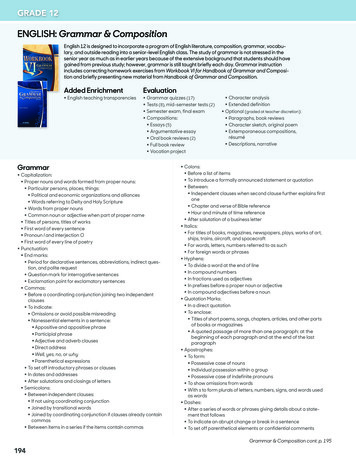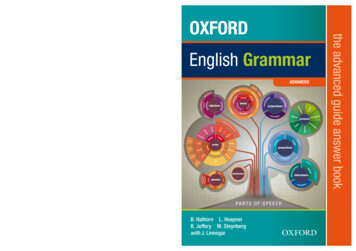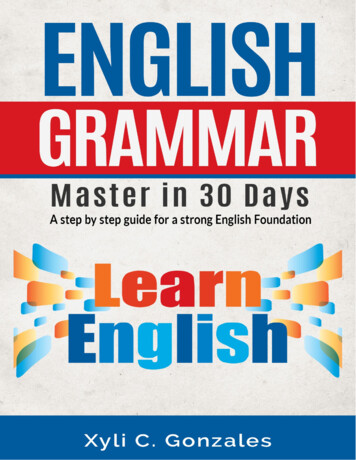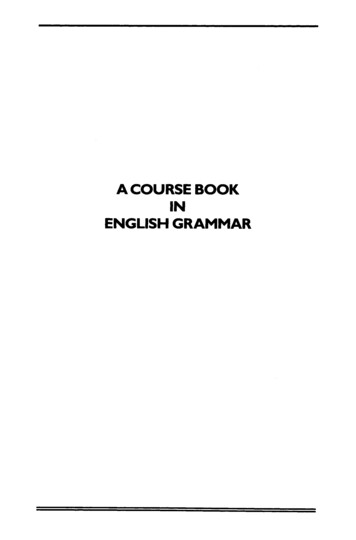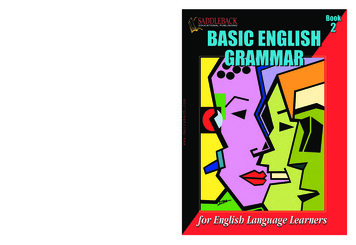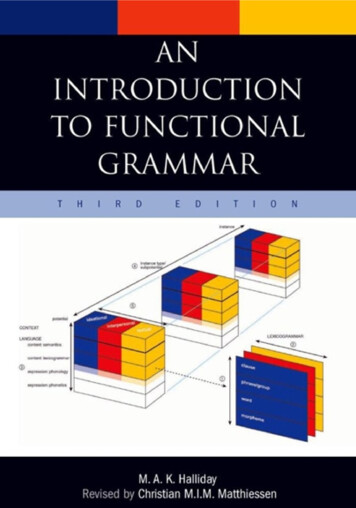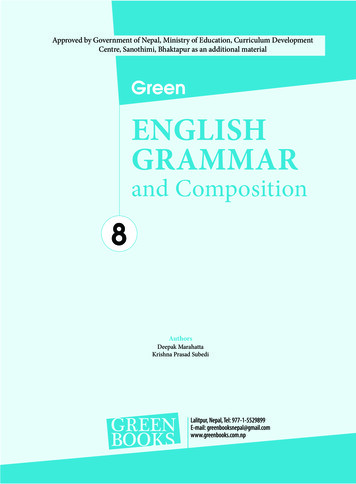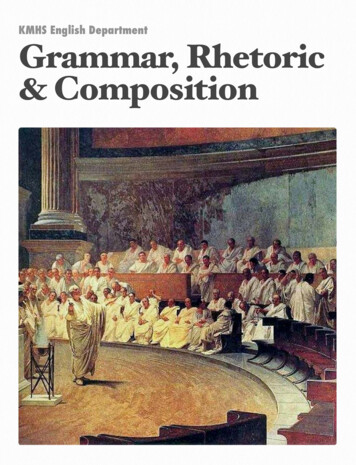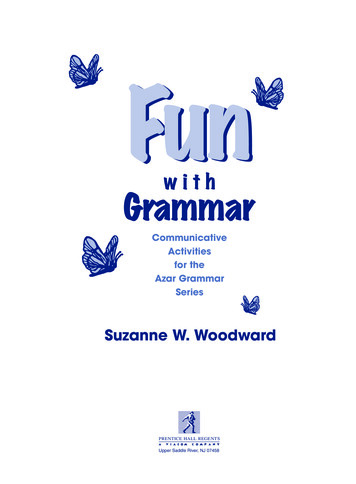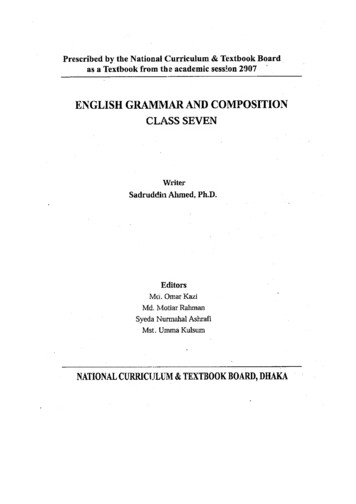
Transcription
Prescribed by the National Curriculum & Textbook Boardas a Textbook from the academic session 2007ENGLISH GRAMMAR AND COMPOSITIONCLASS SEVENWriterSadruddin Ahmed, Ph.D.EditorsMci. Omar KaziMd. Motiar RahmanSyeda Nurmahal AshrafiMst. Umma KulsumNATIONAL CURRICULUM & TEXTBOOK BOARD, DHAKA
Published byNational Curriculum & Textbook Board69-70, Motijheel Commercial Area, Dhaka.{ All rights reserved by the Publisher ]First edition : December, 2007Revised Edition : December, 2008Reprint: July, 2,013Reprint: July, 2014CoverSudarshan BacharSujaul AbedeenComputer TypesettingPerform Color Graphics (Pvt.) Ltd.DesignNational Curriculum And Textbook BoardFor free distribution from academic year 2013 by the Government of BangladeshPrinted by: Paper Processing & Packaging Ltd.Bashundhara Avenue Road, Bashundhara R/A, Dhaka-1229
PrefaceEnglish Grammar and Composition’ for class seven has been written inaccordance with the approved curriculum of the National Curriculum andTextbook Board (NCTB),English Grammar is not included explicitly in the existing English textbookbased on communicative approach. Fur this reason the general students facedifficulties to solve grammatical probltms as well as to compose expressions.People from different comers raised this question and suggested to introducegrammar explicitly. Henceforth NCTB in accordance with therecommendations of the experts/workshop has undertaken the endeavour toprepare this book.The aim of this book is to bring about a change in teaching and learningEnglish Grammar and Composition - a change that will enable the learners touse grammar in context. Practice in composition tasks will help to develop thelearners’ writing skill. It will encourage and make them confident to write theirown thoughts, ideas and feelings. This will also relieve them from memorizingcompositions for preparing themselves for examinations.I hope the book will be of great help to the students in learning Englisheffectively.I am thankful to Professor Dr. Sadruddin Ahmed for undertaking the greateffort to write this book. I also thank Md. Omar Kazi, Md. Motiar Rahman,Syeda Nurmahal Ashrafi and Umma Kulsum for editing the book.I would like to thank a lot of other people who were involved in the process ofpublishing the book.We will consider our endeavour fruitful if our students find the book useful.Suggestions from any comer for further improvement of the book will becordially considered.Professor Md. Abul KashemMiahChairmanNational Curriculum & Textbook Board,Dhaka
ContentsSubjectPage No.1.Nouns:.\2.Pronouns :.123.Adjectives :.264.Adverbs:.345.Prepositions:.446.Articles :.537.Degrees of Adjectives :.688.Verb (to be)9.Verb (Transitive):.;.7610.Modals :.8011.Tenses:.9012.Conditional Sentences:13.Subject-Verb Agreement:14.Composition (Paragraph): .12315.Composition (Dialogues); .13216.Composition (Letter):13717.Composition (Essay Writing) : .14918.Sample Question:72106.115160
Unit 1 ’Lesson 1: NounsProper nouns: Names of persons are called proper noqns. Spelling of suchnames begin with a capital letter:Nazrul IslamShakespeareWordsworthShelleyNouns that refer to relationships between the people of a family such as’mother’, 'father', 'aunt' can also be used like names to address people or refer tothem:Father will not like it.Mother will be displeased.Words which show someone’s social status are called titles. They are spelledwith a capital letter:Dr. SmithLord TennysonMrs. HuqHere is a list of most common ticeSaintPrincessSir
2English Grammar and CompositionA few titles can be followed by the people's first name:Queen ElizabethKing FahadLady DianaThe names of organisations, institutions, ships, magazines, books, plays,paintings are also proper nouns and are spelled with capital letters:Dhaka UniversityThe Bangladesh ObserverDhaka City CorporationThe EconomistGulliver's TravelsThe Daily StarThey are sometimes used with 'the'The Daily IttefaqExercise1. What are proper nouns?2. Name the types of proper nouns.3. Classify the following proper nouns into their types:NazrulIslamMotherProfessorQueen VictoriaRajshahi UniversityThe Daily StarThe IttefaqLesson 2 : Collective Nouns and Nouns Referring to GenderNouns which refer to a group of people or things are called collective nouns.When you use a collective noun, you can use either a singular verb or a pluralverb after it.The committee has made its report.The committee have made their report.The public is unhappy about the rising prices of essential items.The public are unhappy about the rising prices of essential items.
3English Grammar and CompositionThe government has reduced taxes.The government have reduced taxes.Here is a list of common collective agangfamilyoppositionNouns referring to males or females:Some nouns refer only to males and others to females. For example, somenouns indicating people’s family relationships, such as ’father’ 'brother' ’son’and some nouns indicating people's jobs, such as 'waiter' and policeman canonly be used to refer to males. In the same way, 'mother' ’sister’ ’daughter','waitress’ 'actress’ and 'sportswoman' can only be used to refer to females.Most names of animals are used to refer to male and female animals.ExamplescathorseelephantmonkeysheepIn some cases there are different words that refer specifically to male animalsor female animals; for example, a male horse is a 'stallion and a female horseis a 'mare'.
4English Grammar and CompositionHere is a list of some common specific words for male and female animals.MaleFemalestallionmareramewetigertigressd sstagdoeExercise1.What are collective nouns?2.Mention five collective nouns and make sentences with them.3.Name five nouns which refer to males.4.Name five nouns which refer to females.5.Classify the following nouns into male and tagLesson 3 : Countable and Uncountable NounsThe most important thing about the classification of nouns is to knowwhether a noun is countable or uncountable because it is this distinctionwhich determines the use of articles.
English Grammar and Composition5Nouns in English are either countable or uncountable. A countable nounrepresents things which can be counted:man, woman, boy, girlAn uncountable noun represents things which cannot be counted:water, milk, sugar, flour Countable nouns have singular and plural forms. They take singular and plural verbs:He is a clever boy.These boys are students of class seven.She has a dictionary.Dictionaries are very useful. They can have a/an and numbers in front of them:This is a book of grammar and composition.There is an apple on the table.Going on a picnic is a good idea.There are four eggs in the bowl.He came up with a number of ideas. They have not many in front of them:He hasn t many friends.There were not many people at the meeting. They take a few in front of them:Will you have a few grapes?Can I have a few
6English Grammar and CompositionExercise1. Correct the errors in the following sentences :a. This is ball.b. Hena is student.c. These egg are fresh.d. Umbrella is useful thing in the rainy season.e. Cow is domestic animal.2. Put numbers in the blanks:f. We have-fingers on each hand.g. There are-members on the committee.h. They have-children.i. We have-districts in Bangladesh.j. There are-——public universities in this country.3. Use not many or a fewin the blanks.k. He has-friends.l. Will you have-peas?m. Can I have-potatoes?n. Would you like-grapes?o. - people attended the meeting.Lesson 4 : Countable and Uncountable Nouns (continued)Uncountable Nouns:They only have one form.They always take a singular verb.
English Grammar and Composition7ExamplesMilk is good for us.Their furniture is very modem.Too much tea isn 't good for you.The weather today is very nice.They never have a/an or a number directly in front:weather :We have nice weather today,information:I have had no information about his activities,advice:We need advice about our plan,furniture :They have expensive furniture,leather:This bag is made of leather,news:There is good news for you.They have not much in front of them:I have not much information about the incident.He has not much money.They have a Uttle in front of them:Will you have a little gravy?Can I have a little sugar?Note: Much and many are used in negatives and questions: in positivesentences a lot of is normally used:There were a lot o/people at the meeting.We had a lot of difficulty getting here.To make uncountable nouns countable, use measure words : a measurewords of
English Grammar and CompositionExamplesa piece of informationa litre of milkajar of jellya glass of watera bottle of honeya bit of lucka slice of breada plate of ricea tube of toothpastea cake of soapa packet of washing powderSome words can be used in two different ways: one countable: oneuncountable:There is a hair in your soup.She has beautiful hair.What a lovely colour!Films are very dull without colour.The boy threw a stone at the window. This building is made of stone.Some common uncountable nouns:a) Whole groups made of similar items:baggage- clothing, equipment, furniture, garbage, jewellery, luggage,machinery, money, scenery, trafficb) Fluids:water, tea, coffee, milk, soup, petrol, blood, etc.
English Grammar and Composition9c) Solids:ice, bread, butter, cheese, meat, gold, iron, silver, paper, wood, cotton,wool, etc.d) Gases:steam, air, oxygen, nitrogen, smoke, fog, pollution, etc.e) Particles:rice, com, dirt, dust, flour, grass, hair, salt, sugar, wheat, etc.f) Abstractions:beauty, confidence, courage, education, enjoyment, fun, happiness,health, honesty, hospitality, happiness, intelligence, justice, knowledge,laughter, luck,music;patience, peace, progress, recreation,significance, sleep,truth, violence, advice, information, news,evidence,-time, space, energy, homeworkg) Languages:Bangla, Arabic, Chinese, English, Urdu, etc.h) Academic disciplines:chemistry, engineering, history, literature, mathematics, psychology,etc.i)Recreations:football, cricket, chess, bridge, etc.j)Natural phenomena:weather, dew, fog, heat, storm, lightning, snow, thunder, darkness,sunshine, electricity, fire, etc.k) Activities:driving, swimming, walking, running, jumping, etc.Exercise1. Correct the errors in the following sentences:a. I have a good news for you.
10English Grammar and Compositionb. I'm in trouble. Can I have an advice?c. Do you have spare pen?d. It is beautiful toy.e. There are four apple on the tablef. Umbrella comes useful in the rainy season.g. This informations are wrong.2. Fill in the blanks with:not many, a few, a lot of, a little, not much, few. Do not use the samewords twice.a. There is-rice in the bowl.b. He is a businessman; he has—.-—moneyc. He is very unsociable. He has-- friendsd. -learning is a dangerous thing.e. If you spend-minutes every day taking exercise, you will keep fit.3. Use these measure words in the blanks:a tube of, a kilo of, a piece of, a slice of, an article ofa. Can I have-—toast?b. I am going to buy-toothpaste.c. Please give me-rice.d. A table is--furniture.e. Can I have-bread?
English Grammar and Composition11Lesson 5* Countable and Uncountable Nouns (continued)Read the following pieces of dialogues.1.Shopkeeper:What would you like?Customer:I’d like a toothbrush and a tube of toothpaste.Shopkeeper:Anything else?Customer:I also want a candle and a cake of soap.Shopkeeper:Here you are.Customer:Thank you very much.In the dialogue above there are some nouns: toothbrush, toothpaste, candleand soap. These nouns can be classified into two groups: countable anduncountable. Countable nouns represent things which can be counted.Toothbrush and candle are countable nouns because they can be counted.These nouns are singular and singular nouns require an article: ’a’ toothbrush,a' candle. On the other hand, toothpaste and soap are uncountable nouns. Thethings they represent cannot be counted. To quantify them, we need to usemeasure words: ’a tube' of toothpaste and 'a cake’ of soap.f A other:Have you finished your meal?Son:I feel like eating something more.Mother:Would you like a sweet?Son:I won’t say’no'.Mother:How about a glass of milk?Son:No, thanks.In the second dialogue there are also a few countable and uncountable nouns.Because milk is an uncountable noun; a quantifier ’a glass of has been used.The distinction between countable nouns and uncountable nouns is importantbecause they have different characteristics.
12English Grammar and CompositionLesson 6 : PronounsPronouns: There are several types of pronouns:personal pronounsindefinite pronounspossessive pronounsreciprocal pronounsreflexive pronounsrelative pronounsdemonstrative pronounsinterrogative pronounsPersonal pronounsYou use personal pronouns to refer to yourself, the people you are talking to orthe people or things you are talking about. There are two sets of personalpronouns: subject pronouns and object pronouns. Here is a table of subjectpronouns.SingularPlural1st personIwe2nd personyouyou3rd personhetheyshetheyittheyT: You refer to yourself by using the pronoun T. This is always written with ncapital letter.I don't know him very well.I think I made a mistake.May I ask you a question?’You': You refer to the person or people you are talking to as 'you'. Note thatthe same word is used for the singular and the plural.You are right.Would you pass me the salt?How are you?
English Grammar and Composition13'You1 is also used, especially in spoken English, to refer to people in general,rather than to the person you are talking to:You can't predict the results of the general elections.You don't know what will happen.'he' and 'she': You refer to a man or a boy as ’he’ and to a ’woman or a ’girl' as'she'.Kamal is fat. He weighs 15 stone.His wife is slim. She weighs only 8 stone.The boy is clever. Isn't he?The girl is intelligent. Isn't she?'It': You use 'it' to refer to anything which is not male or female; for example,an object, a place or an organization or something abstract.I have bought a camera. It is very expensive.Have you ever been to Dhaka? Yes, it is very crowded.Which is your favourite TV channel? It is the BTV.'it' is often used to refer to an animal when the gender is not known or notconsidered to be important. Some people also refer to babies in this way.He has a dog. He loves it.Look at the baby. It is smiling.You also use 'it' to refer to a situation, the time, the date or the weather:It is very quiet here.It is ten o'clock.It is 18 August.It is cold and windy.
14English Grammar and Composition'we': You use W to refer to a group of people which includes yourself, and thegroup can be:'you' and the person or people you are talking to:Where shall we go for a picnic?you and the person or people you are talking to and one or more othersnot there at the moment.Weare not interested in politics: You and I and Asgar.'you' and one or more other people, but not including the person orpeople you are talking to:I do the cooking; he does the washing; we share the washing-up.any group which you feel yourself to be part of, such as a school, yourlocal community or even mankind as a whole.We are a monolingual nation.We all need money.’they': you use they' to refer to a group of things or to a group of peoplenot including yourself or the person or people you are talking to.They say life is not a bed of roses.They believe that the world has become a global village.Exercise1. Use personal pronouns in the blanks.a. -is wrong.b. —-—are right.c. Would-like a piece of cake?d. -all make mistakes.e. —-—can't say which party will win the elections.f. He is smart. Isn't——?g. She is well-dressed. Isn't-.?
English Grammar and Composition15!. Fill in the blanks with the correct pronouns.a. He has bought a camera. What make is-?b. Someone is knocking at the door. Who is—?c. The dog is barking. Will you call—-back?d. What is love of one's country called? ——is called patriotism.J. Use that, this, these and those in the blanks.a. —is an interesting bookb. —is a toy.c. -are coloured pencils.d. -are marbles.4. Choose the correct pronoun in the following sentences.a. I don't like (he/him) very well.b. May (I/he) ask you a question?c. Will (he/you) pass me the salt?d. How are (he/you?e. I think (I/he) have made a mistake.f. (He/you) can't say what is going to happen tomorrow.g. How is the baby? (He/It) is well.w*5. Use appropriate pronouns in the blanks.a. -must stand together in times of danger.b.—all need food and sleep.c. You wash the clothes. I clean the rooms.-share the work.d. Where shall-go for a picnic?e. - (They/He) say life is full of sorrows.f. Mina is in class six.-(He/she) is a good student.g. He does not like vegetables, but his sister likes (it/them).
16English Grammar and CompositionLesson 7 : Reflexive PronounThere are two forms of reflexive pronoun used for the second person. You use'yourself when you are talking to one person. You use yourselves' when youare talking to more than one person or referring to a group which includes theperson you are talking to.Examplesa. Can you do it yourself?b. How many of you are here? Count yourselves.You can use a reflexive pronoun to make it clear that the object of a verb is thesame person or thing as the subject of the verb. For example: 'Nasim killedhimself means that Nasim did the killing and he was also the person who waskilled. More examples:a. He stretched himself on the sofa.b. They introduced themselves.c. The speaker repeated himself.d. A computer cannot work itself.*You can use reflexive pronouns to emphasize who or what you are referring to.I myself will go and see him.We ourselves are to blame for the accident.You use reflexive pronoun after a preposition:I am ashamed of myself.He can cook for himself.
English Grammar and CompositionExercise1. Use reflexive pronouns in the blanks.a. I-posted the letter.b. She did the cookingc. You misplaced the key and you ought to be ashamed ofd. We-are to blame for our misfortune.e. I often sit at the window byf. When you go out, take care ofg. Good health-is an asset.
English Grammar and Composition18Lesson 8 : Indefinite PronounsWhen you want to refer to people or things you do not know exactly who orwhat they are or their identity is not important, you can use an indefinitepronoun. An Indefinite pronoun indicates only that you are talking aboutpeople or things, rather than referring to a specific person or thing.He was waiting for something.I was there before anybody came.Here is a list of indefinite oneno y:Anybody can answer that question.everybody:Everybody is welcome to the meeting.nobody:Nobody knows where he lives.somebody:Somebody must have taken my purse.anyone:Anyone can take his place.eveiyone:Eveiyone is not eligible to vote.no one:No one in this world is absolutely happy.someone:Someone should represent me at the meeting.anything;The situation is tense. Anything might happen.nothing:Nothing is known about him.something:We should do something for the poor.
English Grammar and Composition19You always use singular verbs with indefinite pronouns:Is everyone in?Everybody recognizes the importance of English.Nothing is certain in this world.You use indefinite pronouns ending in 'thing' to refer to objects, ideas,situations or activities:Can I do anything to help?He said nothing for a while.Exercise1. Use indefinite pronouns in the blanks.a. Does-know when the school will be closed for Eid holidays?b. Are you looking for-?c. -can help you in the exam. You have to help yourself.d. -knows our national anthem.e. -is to be taken lightly.f. -must have taken my dictionary.g. Keep quiet.-is coming.h. It's a simple question.-can answer it.
20English Grammar and CompositionLesson 9 : Reciprocal PronounsThe reciprocal pronouns 'each other' and 'one another' are used to indicate thatpeople do the same thing, feel the same way or have the same relationship.We help each other.Mr Hasan and his wife understand each other.We send each other gifts at Eid.Note that there is little difference between each other and one another.ExerciseUse reciprocal pronouns in the blanks.a. Our neighbours are good. We always helpb. We send-New Year greetings.c. We greet-whenever we meet.d. Life becomes pleasant when we cooperate with-.e. Students should not quarrel with-.f. The girls are making jokes with-.g. Neighbours should be on good terms with-.
English Grammar and Composition21Lesson 10 : Demonstrative PronounsWhen 'this', 'that', ‘these’ and ’those1 are used as pronouns, they are called’demonstrative pronouns'. They can be used as the subject or the object of asentence or a preposition.’This’ and ’that' are usually used as pronouns when they refer to things. You usethem instead of a singular countable noun or an uncountable noun.Examplesa. This is a list of books you need to buy.b. This is the first chapter of the book.c. That was a difficult problem for me.d. That looks interesting.’This' and 'that' can be used as pronouns to refer to a person when you areidentifying someone or asking who she/ he is.Who is this?He paused at a photograph and asked 'Is this your father?’Was that Salma on the phone?When you introduce people, you can say 'This is Mira'.or 'This is Mr and MrsHelal.' Note that you use 'this' even when you are introducing more than oneperson at a time.'these' and 'those' can be used as pronouns instead of a plural countable noun.They are most often used to refer to things.a.’I have brought you these,’ he held out a packet of handkerchiefs.b.Vitamin tablets usually contain vitamins B-complex. These areavailable from chemists.c. These are no ordinary shoes.d. Those are easy questions.e. Many people turned up for the interview and some of those weremarried women.
22English Grammar and CompositionExercise1. Use 'this' or 'that' in the blanks.a. -—-is no problem.b. I can help you withc. -is my dictionary.-is yours.d. Who is-?e. -is Mr and Mrs Hasan.f. Is-your sister?g. Who was-at the door?2. Fill in the blanks with 'these' and 'those'.a. Take-, 'he said, handing her some oranges.b. What are-?-are aspirin tablets.c. -are expensive shoes.d. -are beautiful flowers.e. -are the people I dislike.
English Grammar and Composition23Lesson 11 : Relative PronounsWhen a sentence consists of a main clause and a relative clause introduced by'who' 'which' or 'that' these words are known as relative pronouns. Like otherpronouns, they refer to somebody or something that has already beenmentioned. At the same time they are conjunctions because they join theclauses together.The relative pronoun usually acts as the subject or object of the verb in therelative clause.a. He is the only man who can help you.b. I have a job which keeps my family going.Here is a list of the most common relative pronouns.that which who whom whoseRelative pronouns do not have masculine, feminine or plural forms. The samepronoun can be used about a man or a woman, or a group of people.a. I have an uncle who lives in Japan.b. I know a girl who speaks English well.c. There are many people who hate smoking.d. He is the boy whose pen is lost.e. This is the man whom you can rely upon.ExerciseJoin the following pairs of sentences with relative pronouns.a. Kamal has a brother. His brother lives in Noakhali.b. They have a garden. It needs tending.c. Her grandmother is old. She needs looking after.d. She has lost her purse. It contained a lot of money.e. I borrowed a book from the library. It is missing.
24English Grammar and Compositionf. The building is old. It should be given a coat of paint.g. The road is in disrepair. It should be repaired.Lesson 12 : Interrogative PronounsThe interrogative pronouns are 'who' ’whose’ 'whom* ’what’ and ’which’. Theycan be used as the subject or object of a sentence or as the object of apreposition. Interrogative pronouns refer to the information you are asking for.’who' ’whose’ and ’whom1 are used when you think that the answer to thequestion will be a personExamplesa. He lost his father. Who?b. He looked at the dog. Whose is it?c. To whom are you engaged?d. What are you doing?’which’ and ’what’ are used when you think that the answer to the question willbe something other than a person.Examplesa. Which do you prefer? Tea or coffee?b. What does he want?Interrogative pronouns are also used to introduce reported questions.He asked me who was on telephone.I wonder what he would do now.When you report a question You do not treat it as a question by using an interrogative word order. You do not use a question mark.
English Grammar and Composition25ExamplesThe question 'Did you enjoy the meal?' could be reported 'I askedhim/her if he/she enjoyed the meal.'Exercise1. Use interrogative pronouns in the blanks.a. I don't know - he wants.b. I don't know - he makes a living.c. Tell me - you were absent yesterday.d. Do you know - he lives?e. I don't know - he will come.f. Tell me - you go to bed.g. Tell me - you haven’t done your homework.2. Answer these questions;a. Who is this?b. What are these?c. Which do prefer? Tea or coffee?d. There is a car waiting outside. Whose is it?e. Who is at the door?
English Grammar and Composition26Lesson -13 AdjectivesStudy the following sentences.1.1a) Maria is an intelligent student.b) I need much work.c) Rashid ate four mangoes at a time.d) Yesterday I bought that book.In the above four sentences, the bold words intelligent, much, four, that etcshow the description, quantity, number and demonstration of the nouns student,work, mangoes and book.Notice that these words add something to the meaning of the nouns that follow.Adjectives describe nouns. Adjective gives a little different meaning to a Noun.Adjectives are said to qualify, limit or restrict the nouns which theyaccompany. An adjective is neither singular nor plural. A final - s is neveradded adjective.Therefore, an adjective is a word, which is used to add something to themeaning of a noun or to qualify a noun.2.0Generally adjectives are classified as- Proper, DescriptiveQuantitative, Numeral, Pronominal and emphasizing.2.1 Proper Adjectives are formed from proper nouns. If the Proper Nounswork as adjectives, they are called Proper Adjectives.For example:a)The Chinese athletes won victory in the Olympic Games.b)The Bangladeshi players won gold in 29th Olympiads.c)We crossed the Persian gulf by swimming.The bold words Chinese, Bangladeshi and persian are originated from propernouns -China Bangladesh and Persion.
English Grammar and Composition272.2 Descriptive or QualitativeThis type of adjective describes the quality or state of a person or anobjecta) Bangladesh is an agricultural country'.b) We earn foreign currency by exporting manpower.c) Bangalee can sacrifice their lives with smiling face2.2.1 Most of the adjectives are generally descriptive. We can sum up someof them almilitaryrightact ual agrv ialmodemannu alfore historicalofficialsocialcivilhumanopensolidcommer ng
28English Grammar and Composition2.2.2 ExamplesabsoluteThese days kings do not have absolute powers.activeAlthough he is old, he is still active.actualWhat is the actual cost of this machine?agriculturalBangladesh is mainly an agricultural country.basicOur basic problem is overpopulation.centralHe lives in the central part of the city.chemicalHe works for the chemical corporation.civilHe is in the civil service.commercialChittagong is a commercial city.culturalThere are many cultural organisations.dailyMost people go about their daily work.directMany specialists advocate direct method of teaching language.financialHe does not have any financial problem.foreignWe have many foreign embassies in the country.freeWe are a free nation.fullThe glass is full.mentalIt is important to have mental peace.militaryIt is the job of the military to defend the country from foreign attacks,modemA modem city must have an efficient transport system.naturalBangladesh is blessed with many natural resources.properYou should take proper care of your health.religiousThere is religious harmony in this country.rightYour answer is right.straightThe road is straight.sufficientHis income is not sufficient to maintain his family.traditionalOurs is a traditional society.wrongYour answer is wrong.1
English Grammar and Composition2.329Quantitative AdjectiveSuch an adjective indicates to the quantity of the noun it qualifies.i) The patient has to drink much milk.ii) I need some iron pegs.iii) We have little knowledge about his early life.These nouns are not countable. Uncountable Nouns are preceded byQuantitative Adjective. These are also called Indefinite Adjective.2.4 Numeral AdjectiveSome words indicate the number of objects or things of a Noun Suchnouns are countable. These are limited to a certain number. These arealso called definite Adjective,iThe first boy has been awarded a gold medal.ii) Five students from class seven competed for the prize.iii) The seventh boy was injured.In sentences (i) (ii) and (iii) first, 'five' and seventh are Numeraladjectives.The Numera
grammar explicitly. Henceforth NCTB in accordance with the recommendations of the experts/workshop has undertaken the endeavour to prepare this book. The aim of this book is to bring about a change in teaching and learning English Grammar and Composition - a change that will enable the learners to use grammar in context.
